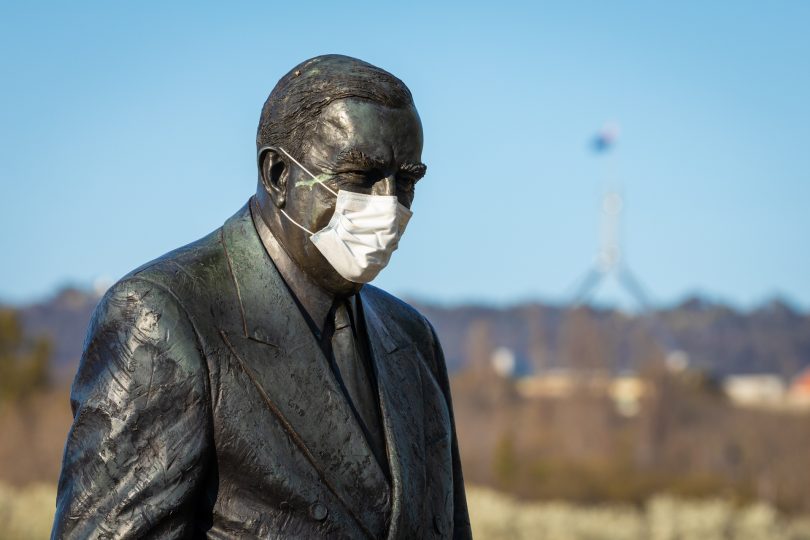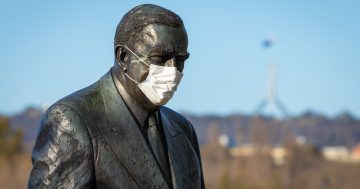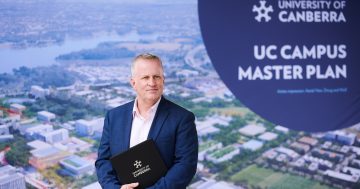
Face masks could be here to stay in Canberra. Photo: Michelle Kroll.
Facemasks may become a common feature of life in Canberra as people choose to wear them long after COVID-19 public health mandates end.
They’ve been a sometimes divisive but highly visible tool in the ACT’s battle to contain the coronavirus.
Some people love them, some hate them, others simply pull their facemask on as advised by public health officials and get on with their day.
Mask mandates were eased significantly on Friday (12 November), reduced to only being needed in ‘high risk’ settings like hospitals, aged care and public transport.
But across the weekend, people were still choosing to wear them in public places they were no longer required.
Professor of psychology Kate Reynolds from the Australian National University’s College of Health and Medicine says mask-wearing could become just a normal part of life.
“Most people are going to wear masks if they believe it’s to keep themselves and others safe,” she says.
“If you were elderly or you thought you were at more serious risk of complications if you got COVID, you may well be choosing to wear those masks.
“I think people would see that now as being very acceptable in a way that wasn’t the case 18 months ago.”
Factors driving that decision include assessing personal risk, seeing others wear them, empathy, and if you thought it made a difference.
“They’re the things that have really driven mask-wearing in the context of COVID, and we would think that the same kind of things would drive the mask-wearing more generally,” Professor Reynolds says.
“It’s possible that depending on what’s going on or whether you’re in a high-density space or whether you perceive there’s a risk, you may well go for that mask again and put it on.”

Will you still wear a mask, even if you are not being told to? Photo: Region Media.
In some countries, face masks were already commonplace in daily life before the pandemic, usually to reduce the transmission of seasonal colds and flu.
But Professor Reynolds says that choice was often driven by high population density.
Though we’re lucky to have more space here, there may still be situations where we can’t avoid close proximity like planes, public transport and busy shopping centres, and “if you’re feeling unwell, or if you know you’re travelling,” she says.
“If I know there’s lots of people there, I might want to put my mask on.”
It’s not just the pandemic that has helped to entrench our mask-wearing habits in Canberra.
Many people wore them during the bushfires to reduce smoke inhalation, which further normalised their use.
“We’ve all got them now, we know how to use them, we have them at hand, lots of people did start buying different masks around the bushfires,” she says.
“For Canberra, we’ve had both of those events that have trained people very well to put a mask on.”
Locals embraced mask-wearing to the point that they became a symbol of style and personality.
The black cotton face mask became as recognisably Canberran as the puffy black jacket (and they matched well together in an outfit too).
Some may simply not be ready to discard their collections like last season’s fashion trend.
“I’ve got a drawer full of them,” Professor Reynolds adds with a laugh, “so it would be good for all that not to go to waste.”
In a statement to Region Media, ACT Health says although restrictions are easing, people should continue to practise COVID-safe behaviours.
They also strongly encourage mask-wearing where physical distancing isn’t possible and in other high-risk settings.
“Some people may choose to continue to wear a face mask in other settings if that is what feels comfortable for them,” a spokesperson says.
“Face masks protect you and the broader community, including those who are unable to get vaccinated, such as children under 12.”
So we could see more Canberrans could make wearing a mask a personal choice in a post-pandemic future (whenever that may be).























